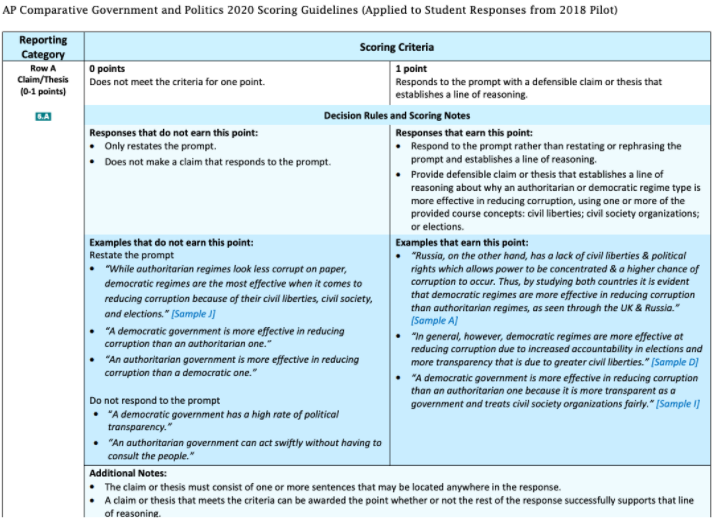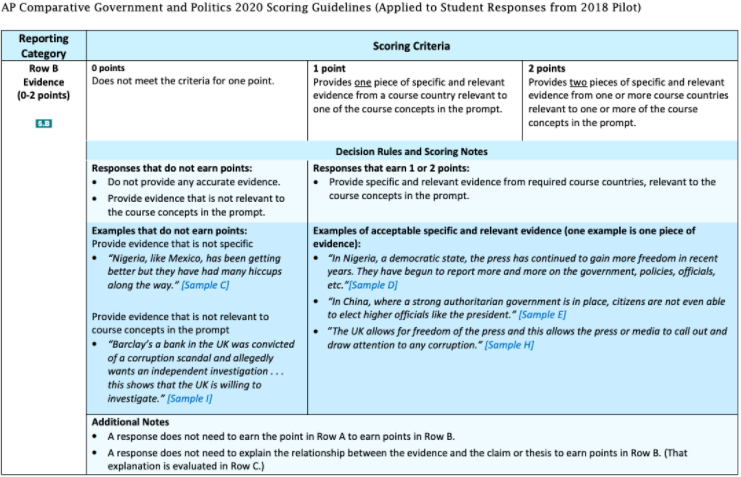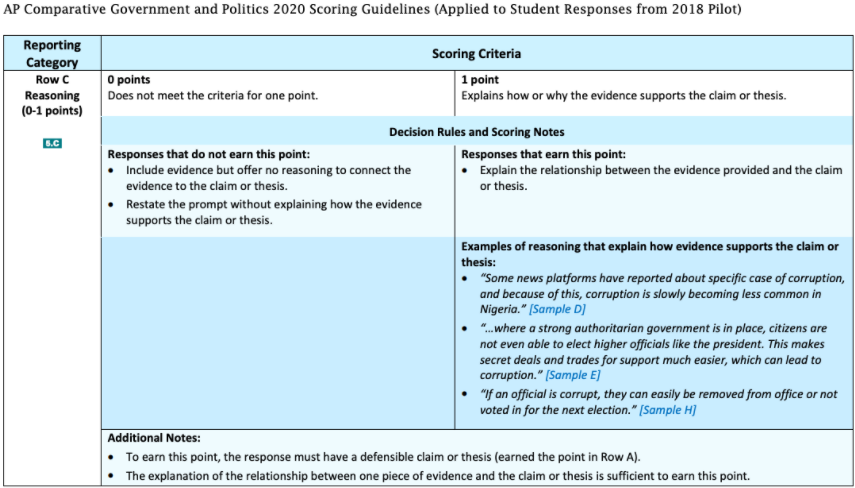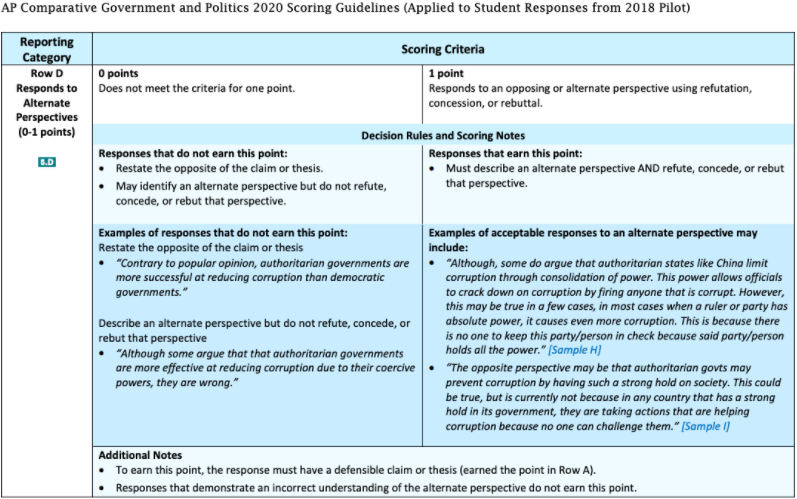2022 AP Comparative Government Exam Guide
7 min read•december 2, 2021
AP Comparative Government 🗳️
90 resourcesSee Units
Your guide to the 2022 AP Comparative Government exam
We know that studying for your AP exams can be stressful, but Fiveable has your back! We have created a study plan that will help you crush your AP Comparative Government exam. We will continue to update this guide with more information about the 2022 exams, as well as helpful resources to help you score that 5. Create a Fiveable account and join Hours 🤝to stay involved in all things AP exams! 😁
Format of the 2022 AP Comparative Government exam
This year, all AP exams will cover all units and essay types. The 2022 AP Comparative Government exam format will be:
Section 1: Multiple Choice Questions
- 55 Questions | 60 Minutes | 50% of Exam Score
- Individual questions (no stimulus): 40–44 questions.
- Set-based questions:
- Quantitative Analysis: 3 sets of questions asking students to analyze a quantitative stimulus (line graphs, charts, tables, maps, or infographics)
- Qualitative Analysis: 2 sets of questions asking students to analyze text-based secondary sources
- The 6 countries addressed in AP Comparative Government and Politics are China, Iran, Mexico, Nigeria, Russia, and the United Kingdom.
Section 2: Free Response
- 4 Questions | 1 Hour 30 Minutes | 50% of Exam Score
- Concept Application: Define or describe a political concept and explain and/or compare political systems, principles, institutions, processes, policies, or behaviors.
- Quantitative Analysis: Analyze quantitative data, identify a trend or pattern, or draw a conclusion from a visual representation and explain how it relates to political systems, principles, institutions, processes, policies, or behaviors.
- Comparative Analysis: Compare political concepts, systems, institutions, or policies in different course countries.
- Argument Essay: Develop an argument in the form of an essay, using evidence from course countries related to the course concepts in the question prompt
Scoring Rubric for the 2022 AP Comparative Government Exam

Courtesy of College Board

Courtesy of College Board

Courtesy of College Board

Courtesy of College Board
Check out our study plan below to find resources and tools to prepare for your AP Comparative Government exam.
When is the 2022 AP Comparative Government exam and how do I take it?
- The AP Comparative Government exam is on May 4, 2022, 12 noon.
- The exam will be a paper test at your school.
You will have 3 hours to take the exam. Create a Fiveable account to get updates on the latest 2022 exam news.
How should I prepare for the exam?
We’ve put together this plan to help you study between now and May. This will cover all of the units and essay types to prepare you for your exam. Join Hours 🤝to talk to real students just like you studying for this exam!
Pre-work: set up your study environment
Before we begin, take some time to get organized. Remote learning can be great, but it also means you’ll need to hold yourself accountable more than usual.
Create a study space.
Make sure you have a designated place at home to study. Somewhere you can keep all of your materials, where you can focus on learning, and where you are comfortable. Spend some time prepping the space with everything you need and you can even let others in the family know that this is your study space.
Organize your study materials.
Get your notebook, textbook, prep books, or whatever other physical materials you have. Also create a space for you to keep track of review. Start a new section in your notebook to take notes or start a Google Doc to keep track of your notes. Get yourself set up!
Plan designated times for studying.
The hardest part about studying from home is sticking to a routine. Decide on one hour every day that you can dedicate to studying. This can be any time of the day, whatever works best for you. Set a timer on your phone for that time and really try to stick to it. The routine will help you stay on track.
Decide on an accountability plan.
How will you hold yourself accountable to this study plan? You may or may not have a teacher or rules set up to help you stay on track, so you need to set some for yourself. First set your goal. This could be studying for x number of hours or getting through a unit. Then, create a reward for yourself. If you reach your goal, then x. This will help stay focused!
Get support from your peers.
There are thousands of students all over the world who are preparing for their AP exams just like you! Join Hours 🤝to chat, ask questions, and meet other students who are also studying for the spring exams. You can even build study groups and review material together!
AP Comparative 2022 study plan
Unit 1: Political Systems, Regimes, and Governments
In this unit, you go over how a political system impacts the lives of its people on a daily basis. You also go over how comparative political scientists generate meaningful conclusions to develop trends in other nations.
📚 Read these study guides:
If you have more time or want to dig deeper:
💻 Learn about the best prep books so you can start studying early:
Unit 2: Political Institutions
Unit 2 can be broken down into 3 Big Ideas, according to the Course Exam and Description (CED):
- Explaining and comparing parliamentary, presidential, and semi-presidential systems. Your goal at the end of this unit is to be able to explain the different political structures in each of the courses' countries. You are then expected to take that knowledge about each Comp Gov country and use it to compare the courses' countries with one another using the skills 💪🏽 you learned in unit 1.
- Executive, Legislative, and Judicial 👩⚖️ Branches. Once you understand the political systems in each of the Comp Gov countries, College Board expects that you will be able to develop an understanding of not only the various structures of the branches but also an understanding of how those structures are used in each of the course countries to wield and maintain power. 🏋🏿
- Advantages and Disadvantages of Political Systems. In addition to knowing and applying what you have learned about the political systems and their branches, it is expected that you can take the knowledge and characterize the advantages and disadvantages of having one system over another with regard to stability, legitimacy, and policymaking. 💯
📚 Read these study guides:
If you have more time or want to dig deeper:
💻 Here are some Multiple Choice and Free Response Guides to assist you while studying!
Unit 3: Political Culture and Participation
All-in-all, this unit is about people 👨👧 and their relationship with the state. You also need to explain what influences the relationship between the state and its people. 💱
📚 Read these study guides:
If you have more time or want to dig deeper:
💻 Here are some Self-Studying/Homeschool tips for AP Comp Gov!
Unit 4: Party and Electoral Systems and Citizen Organizations
In this unit, the focus is on how various electoral systems 🗳️ work in our course countries (UK, Mexico, Nigeria, Russia, China, Nigeria) and how individuals participate in those systems via political parties, interest groups, and systems that support various interest groups.
📚 Read these study guides:
If you have more time or want to dig deeper:
💻 Here is a Cheat Sheet and Review Chart for the Exam
Unit 5: Political and Economic Changes and Development
In this unit, you will explore the political systems and power structures of the six countries that are discussed in the course!
Topics that are included:
- Political responses to global market forces
- The effects of economic liberalization policies
- How governments adapt social policies to address political, cultural, and economic changes
- Rapid industrialization and its impacts
- The causes and effects of demographic changes
📚 Watch these AP Videos:
If you have more time or want to dig deeper:
💻 Here are some practice questions and Quizlets to refresh on the unit:
Browse Study Guides By Unit
👑Unit 1 – Political Systems, Regimes, & Governments
⚖️Unit 2 – Political Institutions
🙋♀️Unit 3 – Political Culture & Participation
🐘Unit 4 – Party, Electoral Systems, & Citizen Organizations
🏗Unit 5 – Political & Economic Changes & Development
✏️Frequently Asked Questions
📝Exam Skills
2022 AP Comparative Government Exam Guide
- Overview of the Multiple-Choice Section
- TYPES OF QUESTIONS (In other words, what will they look like?)
- 1. APPLICATION
- 2. COMPARING AND CONTRASTING COUNTRIES
- 3. ANALYZING DATA
- 4. ANALYZING SOURCES
- How to Rock the Multiple-Choice (Advice)
- Test-Taking Tip #1: Timing
- Test-Taking Tip #2: Read! Read! Read!
- Test-Taking Tip #3: Answering MCQ
- 🖋 Teacher Advice: Verbs!
- Sample Multiple-Choice Questions
- Your guide to the 2022 AP Comparative Government exam
- Format of the 2022 AP Comparative Government exam
- Scoring Rubric for the 2022 AP Comparative Government Exam
- When is the 2022 AP Comparative Government exam and how do I take it?
- Pre-work: set up your study environment
- AP Comparative 2022 study plan
- Unit 1: Political Systems, Regimes, and Governments
- Unit 2: Political Institutions
- Unit 3: Political Culture and Participation
- Unit 4: Party and Electoral Systems and Citizen Organizations
- Unit 5: Political and Economic Changes and Development

© 2023 Fiveable Inc. All rights reserved.